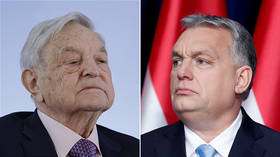Europe banked on George Soros instead of Viktor Orban, and will suffer the consequences – forever

RT,
14
February, 2019
A clash of ideas is occurring in Europe between Hungarian PM Viktor Orban and financier George Soros that will impact the continent forever. But Brussels is only interested in considering one option – the Soros option.
In any other period of European history, Viktor Orban would have been heralded as a noble statesman by many of his peers. The reason is rather straightforward. He is attempting to do exactly what other European leaders have done for centuries before him, and that is defending the continent from foreign incursions. But these are radical new times and the old rules no longer apply.
By now, most people are familiar with the mainstream media's narrative on Europe's plight. Millions of desperate migrants from the Middle East and North Africa, suffering the untold ravages of war and poverty, are streaming towards Europe's borders in a quest for some semblance of peace and happiness. There is a lot of truth to that narrative; millions of innocent people have had their lives totally upended by senseless wars sparked by Western regime change operations. They deserve not only sympathy but physical assistance. At the same time, however, Europeans are expected to sacrifice everything to assist these new arrivals regardless of the cost. And the cost is nothing less than exorbitant.
In Germany, for example, asylum seekers are entitled to as much as €354 ($400) per month, while the state picks up the tab for rent and medical insurance. All told, Germany is expected to fork out – hold onto your hat – €77.6 billion ($86.2 billion) during the period from 2017 to 2020 on "feeding, housing and training" their new guests. In light of that massive assistance, is it any wonder that over one million people crashed Germany's paper border in 2015 alone?
This leads us to an obvious question that the Western media never discusses: Would this great migration of people have occurred without the promise of generous handouts by European capitals? It seems that without some sort of security net in place, the majority of these people would not have risked such a hazardous journey. Moreover, there are huge budgetary considerations that cannot be ignored (yet are), for as any economist knows, money does not grow on trees.
George Soros, the head of Open Society Foundations, believes he has that problem figured out. "To finance it," he explained casually, "new European taxes will have to be levied sooner or later."
Really? Well, judging by the Yellow Vest protests occurring on a weekly basis in the French capital, initially sparked by the imposition of a new fuel tax, we have some good indication as to how enthusiastic Europeans will be for such a plan. In short, not very.
The questions don't end there. How is it possible that George Soros has been able to sell his unproven and very expensive plan for open borders to the European people? We can take some guidance from the pithy expression "Money talks." In that case, nobody has done more talking in Europe than Soros.
Over the years, the billionaire has assembled some 226 "reliable allies" in the European Parliament to promote his vision of a brave new Europe. This cozy arrangement allowed his Open Society European Policy Institute (OSEPI), the EU policy arm of Open Society Foundations, to meet with members of the European Commission on 65 separate occasions last year alone
It's probably safe to say that those closed-door meetings had no small impact on the political landscape of Europe.
Enter Viktor Orban, the bane of Brussels, who is playing a role in European history that cannot be overestimated. The leader of fiercely independent Hungary has taken a "zero tolerance" approach to illegal immigration, refusing to permit a single illegal immigrant to enter his country. Meanwhile, other eastern European countries – Poland, the Czech Republic and Slovakia which, together with Hungary, form the anti-immigration 'Visegrad Group' – have taken similar steps. At the same time, across Europe right-wing parties are surging in popularity.
In direct defiance of Brussels, Orban has ordered the construction of a barbed wire fence that runs along Hungary's southern border with Serbia and Croatia, a project that the mainstream media somehow conflates with "authoritarianism," as if the concept of national borders never existed before in history. Orban sent Brussels a bill for half the cost of the fence, but it was never paid, of course. That's too bad, because it could have been the smartest money the EU ever spent, since it would have spared Europeans the influx of mass illegal immigration.
The Hungarian leader has other ideas that Brussels will probably not be considering any time soon, like ways of addressing Europe's dire demographic problem. This month, Orban announced a raft of new tax and loan incentives for families as part of government efforts to boost the birth rate without depending on immigration flows to accomplish that goal.
"There are fewer and fewer children born in Europe. For the West, the answer (to that challenge) is immigration," he saidin his annual state of the nation speech. "We need Hungarian children."
The plan has some merit. Mothers will be eligible for a 10 million forint ($36,000) subsidized loan, he explained. One third of the debt will be forgiven when a second child is born, and the entire loan waived after a third child is born.
Now compare Orban's plan with that of the Hungarian-born George Soros, who somehow believes that maintaining strong national borders will "fragment the union."
"Beggar-thy-neighbor migration policies, such as building border fences, will not only further fragment the union," he wrote in Foreign Policy. "[T]hey also seriously damage European economies and subvert global human rights standards." Building on that crooked foundation, Soros advised European lawmakers back in 2016 that the EU should spend €30 billion ($34 billion) to accommodate "at least 300,000 refugees each year."
We already know who will be forced to pick up the tab on that massive expenditure, and it's not George Soros.
One reason that Soros and his 226 "reliable allies" support the influx of migrants into Europe is they believe it will somehow offset the continent's demographic and labor shortage. The latter part of that plan has already been proven a disaster. An OECD report found that less than 40 percent of immigrants had completed an "upper secondary school" education or higher, while another study showed that only eight percent of asylum seekers were hired by companies as skilled workers.
Despite clear signs that George Soros' grand plans for the European Union are an utter failure, Brussels continues to heed his every word, while at the same time taking steps to punish Orban.
Just this week, Soros warned, with no loss of irony, that if Europe doesn't "wake up" it will "go the way of the Soviet Union in 1991." The financier fretted over the rise of far-right parties in Europe, which he believes will "enjoy a competitive advantage" in parliamentary elections in May. Yes, that is a very big possibility. Not once did he suggest, however, that just maybe his grand idea of open borders, made all the more tempting with cash enticements, might just have contributed to that "radical disequilibrium" of which he spoke.
If Europe is one day visited by the ghost of its fascist past, George Soros will only have himself to blame.
Influential people like Soros would have made a far greater impact had they advocated on behalf of peace in the Middle East and North Africa, speaking out on US-led interventionist wars that have prompted millions of innocent people to flee their homes.
Innocent people from war-torn countries like Afghanistan, Iraq, Libya and Syria deserve the same rights to peace and happiness without having to travel thousands of miles away from home to find it – which ironically leads them directly into the homelands of the people who invaded them in the first place!
In conclusion, it is highly disturbing that Brussels is willing to give so much credence to a billionaire financier with questionable motives for opening Europe's floodgates to illegal immigration, while vilifying a democratically elected European head of state for attempting to exert some kind of order on a situation that is clearly way out of control.
Robert
Bridge is an American writer and journalist. Former Editor-in-Chief
of The Moscow News, he is author of the book, 'Midnight in the
American Empire,' released in 2013.






No comments:
Post a Comment
Note: only a member of this blog may post a comment.